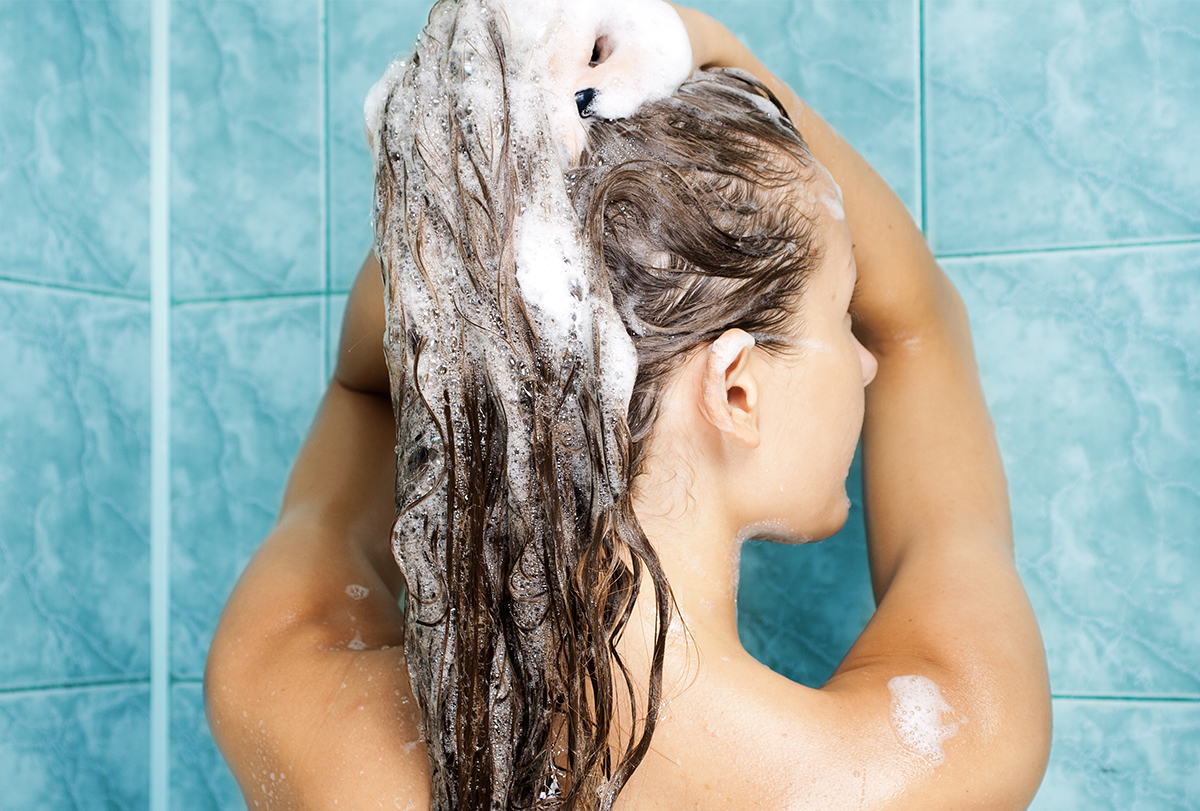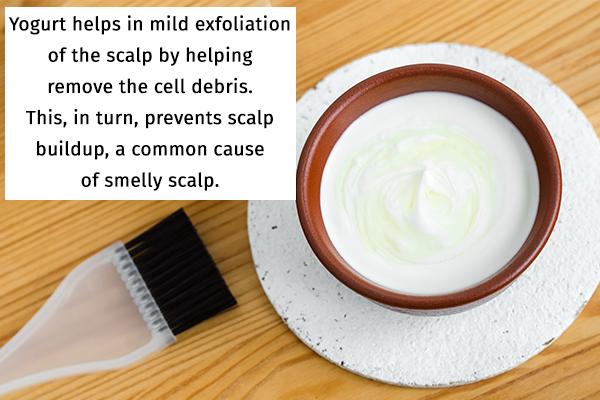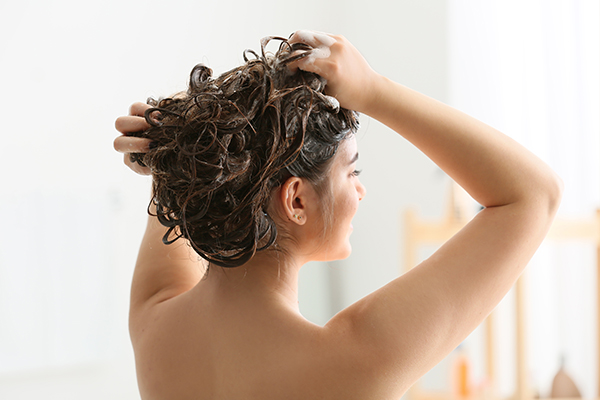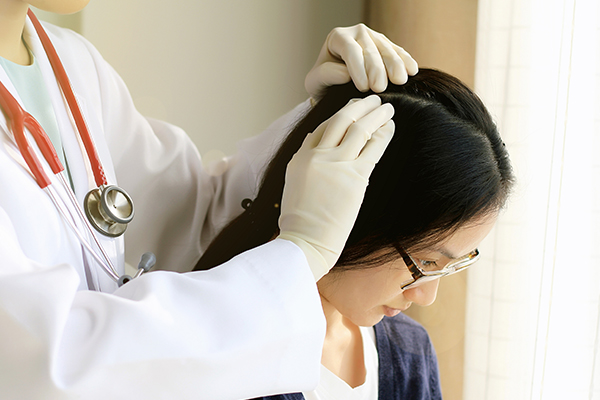In this article:
Various organic substances are naturally present on your scalp, including dead skin cells and oil, along with the skin microbiome. However, certain factors can influence the overgrowth of some of these bacteria on the skin.

This disturbance in the skin microbiome can result in a foul odor coming from the scalp. This smell is emitted in the form of vapors that are by-products of oil and organic matter decomposition by the bacteria.
A smelly scalp can be worrisome for some people. However, this problem can be easily managed with simple home remedies and self-care measures, which will be discussed in this article.
Causes of a Smelly Scalp

The scalp can emit a foul smell, similar to rotten organic matter or sour milk, due to various factors, including:
- Lack of hygiene. Not washing the scalp at regular intervals can lead to the buildup of oil and dead skin cells and microbial growth. This is the most common reason behind a smelly scalp.
- Excessive oil production. An oily scalp may not have a foul smell, but it emits a distinct, generally unpleasant smell. It also enables the buildup of organic matter on the scalp, increasing the risk of a smelly scalp.
- Hormonal changes. Hormonal fluctuations associated with puberty, pregnancy, and polycystic ovary syndrome can stimulate increased production of sebum. (1)(2) An oily scalp, when not taken care of, can disbalance the skin microbiome, often leading to a greasy, smelly scalp.
- Medical conditions. A smelly scalp is a common symptom of various medical problems such as psoriasis, contact dermatitis, seborrheic dermatitis, craniofacial hyperhidrosis, and smelly hair syndrome, among others.
- Stress. Stress can indirectly lead to increased sebum production, contributing to a smelly scalp.
- Environmental conditions. The problem of a smelly scalp is more common in high-humidity conditions. Moreover, exposure to chemicals and airborne pollutants can also cause scalp odor by promoting microbes’ growth.
- Certain hair care products. The use of chemical-laden products and cosmetics can cause a pH change of the scalp, leading to a foul smell.
- Poor diet. Scarcity of nutrients in the diet can affect scalp health.
- Some food items. Dairy products, alcohol, and onions can cause smelly, which releases a foul smell when broken down by the bacteria on the scalp.
- Egg-based hair masks. The use of eggs as hair masks, while beneficial to hair health, can leave behind an unpleasant smell if not washed properly.
Treatment for a Smelly Scalp

While a smelly scalp can generally be managed using at-home measures, you may consult a doctor if the problem is persistent or severe.
The doctor will suggest a treatment depending on the cause and severity of the condition. Treatment options may include:
- Antifungal shampoos. They contain sulfur, zinc pyrithione, salicylic acid, borax, ketoconazole, and selenium sulfide to treat yeast infections. These are available over the counter.
- Medicated shampoos and lotions. These may be advised for managing smelly hair syndrome, wherein the scalp emits a foul smell just after a few hours of washing the hair.
- Aluminum chloride topicals. These medicated products are useful in managing excessive sweating.
- Topical medications. If the cause of the smelly scalp is more serious, such as eczema or psoriasis, you may require prescription-strength topicals that contain corticosteroids, coal tar, or salicylic acid.
Popular Home Remedies to Treat a Smelly Scalp
A smelly scalp is a fairly common problem, but in most cases, it can be solved with proper care and the use of suitable products.
Several hair care products are available commercially, but they are laden with chemicals that can harm your hair health in the long run. It is best to go for natural home remedies that can be made in the form of sprays, mists, and hair masks, to help manage the problem. (3)
Caution: Make sure to conduct a patch test before trying the remedies to check for allergic reactions and sensitivities.
1. Exfoliate with yogurt

Alpha hydroxy acids, such as lactic acid, are generally used in chemical peels as they are excellent exfoliators.
Yogurt is a natural source of lactic acid and mildly exfoliates the scalp (4) by helping remove cell debris. This prevents buildup, a common cause of smelly scalp.
How to use:
- Apply yogurt alone or combined with oatmeal to your scalp directly.
- Rinse your scalp after 15 minutes.
2. Dab some lemon juice
Lemon juice has been shown to exhibit antibacterial properties (5) that may help manage the overgrowth of sweat-decomposing bacteria.
While this use is supported by anecdotal evidence, further scientific research is required to establish lemon’s effects. Lemon juice also helps manage scalp oiliness.
How to use:
- Dilute one part of lemon juice with three parts of warm water.
- Apply the mixture to the scalp.
- Rinse your scalp after a few minutes.
3. Use apple cider vinegar or baking soda
Apple cider vinegar (ACV) (6) and baking soda are commonly used to prepare a hair rinse to treat a smelly scalp. However, this remedy is based on anecdotal evidence only.
It is believed that both these ingredients remove sebum buildup from the scalp, while also improving yeast infections and conditions such as psoriasis. (7)
How to use:
- Dilute ACV or baking soda with water.
- Rinse your hair with the diluted ACV or baking soda solution.
- Shampoo as usual.
4. Try essential oils

Essential oils such as lemongrass oil, (8) ginger oil, tea tree oil, oregano oil, turmeric oil, and neem oil can impart a soothing smell to the scalp.
These oils are potent antimicrobial agents that can help curb the overgrowth of microbes. (9) However, avoid using these oils if you have a problem of oily hair.
How to use:
- Dilute 4–5 drops of any essential oil in a carrier oil such as olive oil or coconut oil, and apply the oil blend to the hair.
- You can also add 4–5 drops of the oil to your shampoo and use it as usual.
- You can buy hair sprays or shampoos that contain these essential oils.
5. Use tomato juice
The use of tomato juice for getting rid of scalp odor is based purely on anecdotal suggestions, rather than scientific studies.
How to use:
- Extract fresh tomato juice and apply it to the scalp.
- Wash your hair as usual after 15–20 minutes.
Preventive and Self-Care Measures
Since a smelly scalp, more often than not, results from the accumulation of cell debris, pollutants, and sebum on the scalp, maintaining proper hair hygiene can help combat the problem.
It is vital to know what suits your hair, since hair can be of different types. The following are helpful tips that can help manage and prevent a foul-smelling scalp:
1. Wash your hair regularly

It is advised to wash your hair two to three times a week using a mild shampoo and condition it afterward. Avoid shampooing or even wetting the hair daily. You must also wash your hair after sweating, such as after a physical workout. Use small amounts of shampoo and massage it on to the scalp gently.
2. Exfoliate weekly
Use homemade masks, sugar scrubs, or commercially available peels and masks to exfoliate the scalp at least once a week. You can also take use of a silicone scalp scrubber.
3. Choose suitable hair products
Avoid chemical-laden products that contain alcohol, parabens, formalin, formaldehyde, and silicone. Instead, go for herbal shampoos that contain Indian gooseberry, neem, camphor, aloe vera, grapefruit seed, and Acacia concinna extracts.
4. Manage oily hair
If you have an oily scalp or hair, select shampoos that contain sulfosuccinates and lauryl sulfates. However, do not use them frequently. You can also use dry shampoos for up to 2 days in a row. Avoid the use of coconut or castor oils, as it can make the scalp greasier.
5. Do not use conditioner on the scalp
Conditioners are meant to be applied on the hair, from the midlengths to the ends. Using a conditioner on the scalp can contribute to buildup.
6. Avoid using hot water
Never wash your head with hot water as it can weaken the hair. Instead, use lukewarm water.
7. Dry your hair properly and gently

Make sure to dry your hair with a soft towel after washing, as damp hair promotes fungal growth. Since heat can damage the hair and make it dry, avoid using a hair dryer.
8. Protect exposure to sun and pollutants
Wear a scarf or a cap when stepping outdoors. However, if you sweat profusely, avoid covering your head for long periods.
9. Comb your hair
Keep your hair detangled by using a bristle brush to avoid trapping pollutants.
10. Keep hair accessories clean
Clean your towels, hairbrushes, wigs, hats, scarves, and even pillow covers to prevent bacterial growth.
11. Avoid touching the scalp
Refrain from scratching your scalp if you feel the urge to itch. Moreover, avoid playing or touching the scalp or hair as much as possible.
12. Improve your diet
Since nutrients are important for hair health, you must consume a well-balanced diet.
Complications of an Ignored Smelly Scalp
A smelly scalp is generally a mild problem that does not pose any threat to health. However, it is important to improve your hair care routine if you have a smelly scalp. Treatment is essential as the cause behind your smelly scalp can aggravate over time, increasing the risk of complications.
Moreover, a smelly scalp is often accompanied by scalp buildup, formed due to the accumulation of sebum, cell debris, sweat, pollutants, and residue of hair products. Scalp buildup, in turn, can cause flaking, folliculitis, sores, hair loss, and even scarring.
When to See a Doctor

A smelly scalp problem can generally be managed with a proper hair care regimen along with home remedies.
However, if there’s no improvement in the condition within a week of trying these treatments, consult a doctor, as the smell may be due to an underlying medical condition, rather than just poor hygiene.
Moreover, immediately contact a doctor if you notice an aggravation of the condition or your scalp reacts to any of the remedies.
Final Word
A smelly scalp is a common problem that occurs due to multiple factors, including poor hygiene, medical conditions, chemicals, and pollution.
It is advised to wash your hair properly, maintain hygiene, and prevent the accumulation of sweat, oil, and debris on the scalp in order to manage the malodor. You can also use home remedies.
Regularly observe your symptoms, and contact a doctor if you do not notice any improvement or if the condition worsens despite self-care.
- Was this article helpful?
- YES, THANKS!NOT REALLY


